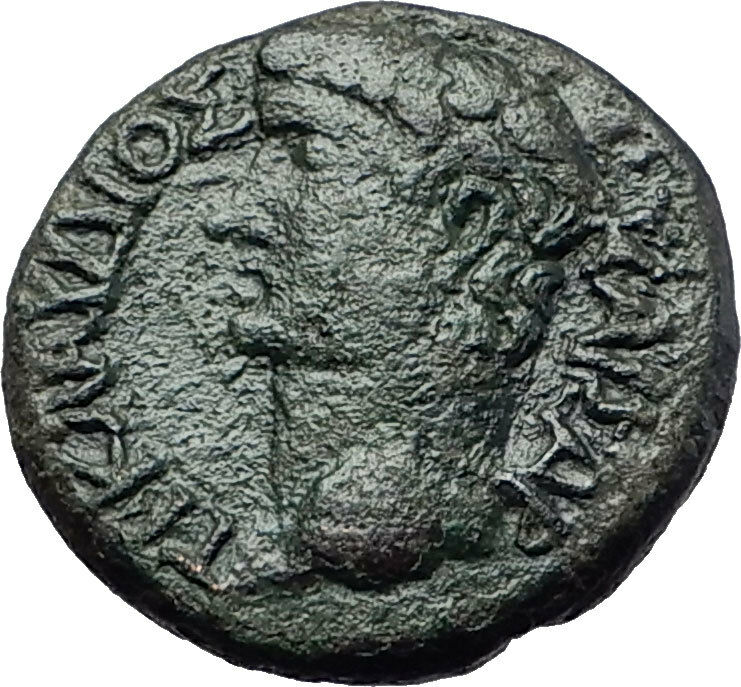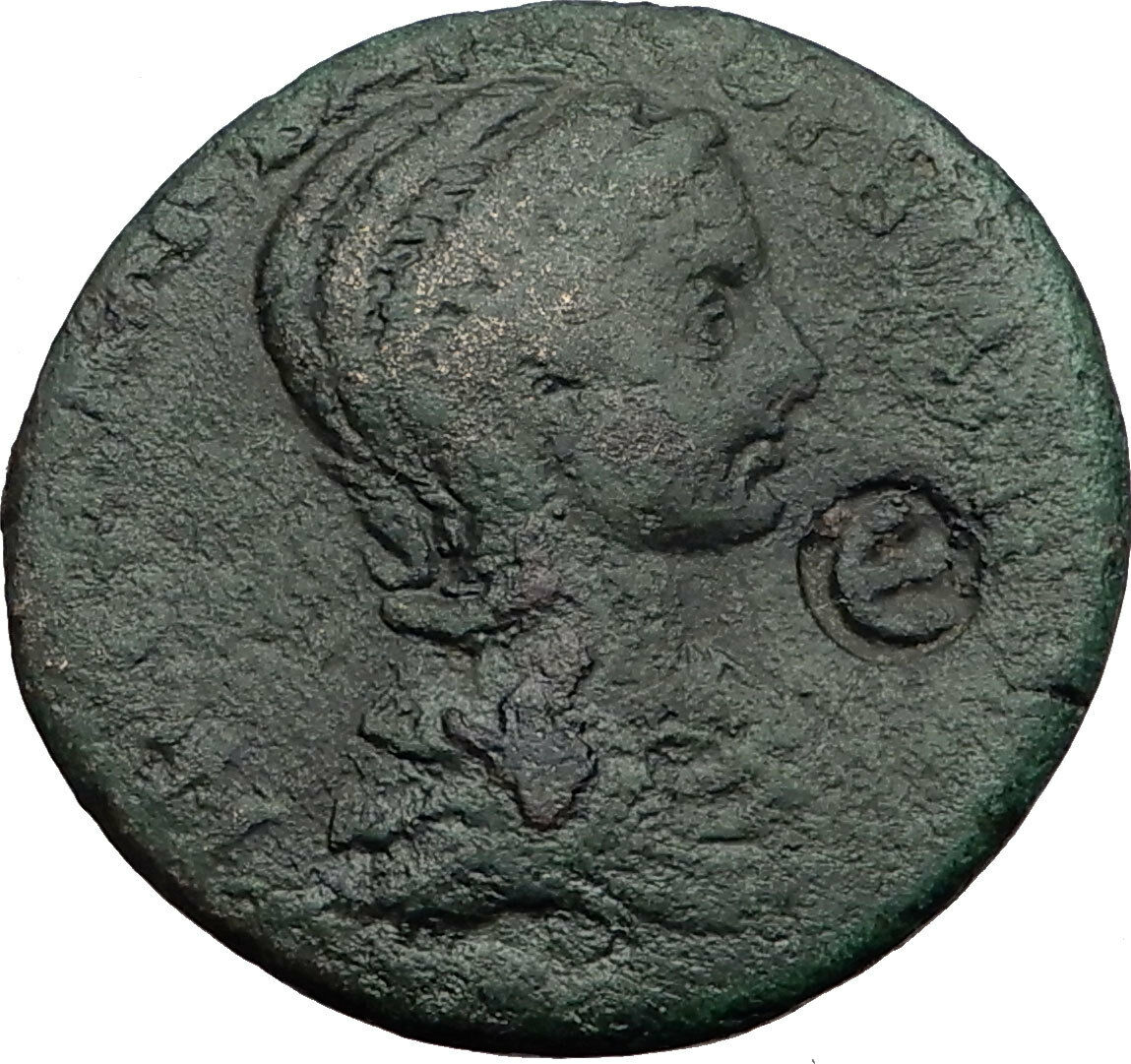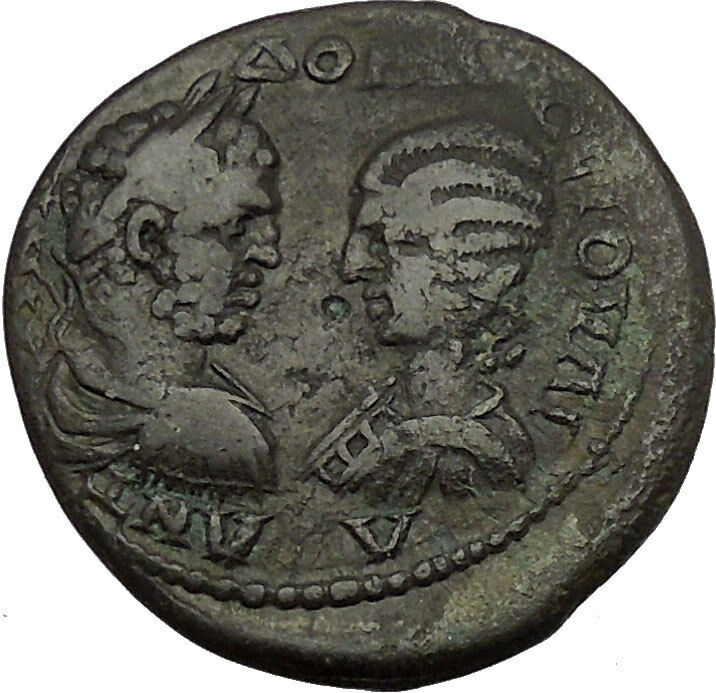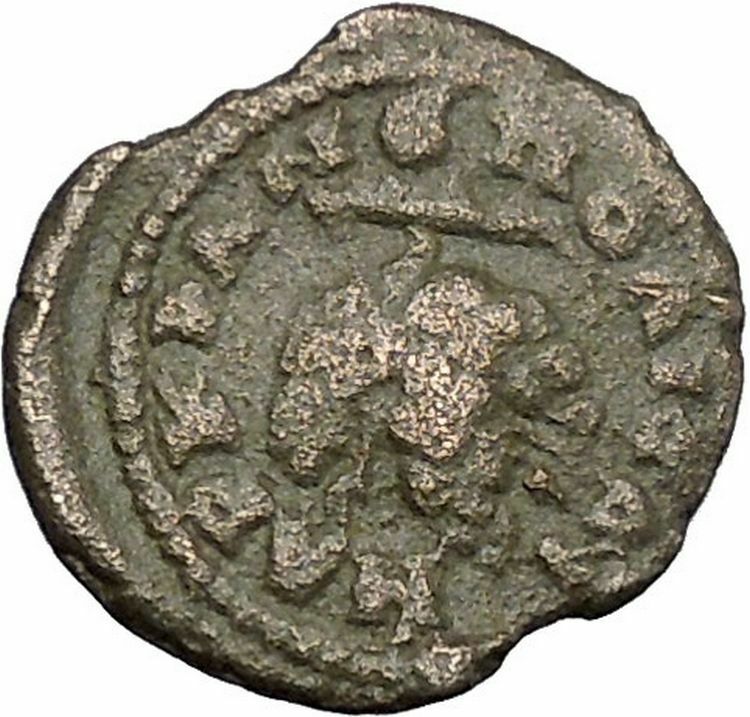|
Septimius Severus – Roman Emperor: 193-211 A.D. –
Bronze 19mm (3.57 grams) of Philippopolis in Thrace
AV. K. I. CЄ. CЄVHPOC, Laureate head right.
ΦIΛIΠΠOΠOΛITΩN, Nude Apollo standing facing, holding patera and branch.
You are bidding on the exact item pictured, provided with a Certificate of Authenticity and Lifetime Guarantee of Authenticity.
 In Greek and Roman mythology , Apollo , is one of the most important and diverse of the Olympian deities . The ideal of the kouros (a beardless youth), Apollo has been variously recognized as a god of light and the sun; truth and prophecy; archery ; medicine and healing; music, poetry, and the arts; and more. Apollo is the son of Zeus and Leto, and has a twin sister, the chaste huntress Artemis . Apollo is known in Greek-influenced Etruscan mythology as Apulu. Apollo was worshiped in both ancient Greek and Roman religion , as well as in the modern Greco –Roman Neopaganism . In Greek and Roman mythology , Apollo , is one of the most important and diverse of the Olympian deities . The ideal of the kouros (a beardless youth), Apollo has been variously recognized as a god of light and the sun; truth and prophecy; archery ; medicine and healing; music, poetry, and the arts; and more. Apollo is the son of Zeus and Leto, and has a twin sister, the chaste huntress Artemis . Apollo is known in Greek-influenced Etruscan mythology as Apulu. Apollo was worshiped in both ancient Greek and Roman religion , as well as in the modern Greco –Roman Neopaganism .
As the patron of Delphi (Pythian Apollo), Apollo was an oracular god — the prophetic deity of the Delphic Oracle . Medicine and healing were associated with Apollo, whether through the god himself or mediated through his son Asclepius , yet Apollo was also seen as a god who could bring ill-health and deadly plague as well as one who had the ability to cure. Amongst the god’s custodial charges, Apollo became associated with dominion over colonists , and as the patron defender of herds and flocks. As the leader of the Muses (Apollon Musagetes) and director of their choir, Apollo functioned as the patron god of music and poetry . Hermes created the lyre for him, and the instrument became a common attribute of Apollo. Hymns sung to Apollo were called paeans .
In Hellenistic times, especially during the third century BCE, as Apollo Helios he became identified among Greeks with Helios , god of the sun , and his sister Artemis similarly equated with Selene , goddess of the moon . In Latin texts, on the other hand, Joseph Fontenrose declared himself unable to find any conflation of Apollo with Sol among the Augustan poets of the first century, not even in the conjurations of Aeneas and Latinus in Aeneid XII (161–215). Apollo and Helios/Sol remained separate beings in literary and mythological texts until the third century CE.
Plovdiv (Bulgarian: Пловдив) is the second-largest city in Bulgaria with a population of 380,683. Plovdiv’s history spans some 6,000 years, with traces of a Neolithic settlement dating to roughly 4000 BC. It is the administrative center of Plovdiv Province in southern Bulgaria and three municipalities (Plovdiv, Maritsa and Rodopi ) and Bulgaria’s Yuzhen tsentralen planning region (NUTS II), as well as the largest and most important city in Northern Thrace and the wider international historical region of Thrace . The city is an important economic, transport, cultural and educational center.
Known in the West for most of its history by the Greek name Philippopolis, it was originally a Thracian settlement before becoming a major Roman city. In the Middle Ages, it retained its strategic regional importance, changing hands between the Byzantine and Bulgarian Empires . It came under Ottoman rule in the 14th century. In 1878, Plovdiv was made the capital of the autonomous Ottoman region of Eastern Rumelia ; in 1885, it became part of Bulgaria with the unification of that region and the Principality of Bulgaria .
Plovdiv is situated in the southern part of the Plovdiv Plain on the two banks of the Maritsa River . The city has historically developed on seven syenite hills, some of which are 250 m high. Because of these seven hills, Plovdiv is often referred to in Bulgaria as “The City of the Seven Hills”.
There are many remains preserved from Antiquity such as the Ancient amphitheatre , Roman odeon, Roman Stadium , the archaeological complex Eirene and others.
Plovdiv was given various names throughout its long history. It was originally a Thracian settlement by the name of Eumolpias. Philip II of Macedon conquered the area in 342-341 BC and renamed the city Philippoupolis (Greek: Φιλιππούπολις), of which the later Thracian name for the city, Pulpu-deva, is a reconstructed translation. After the Romans took control of the area, the city was named Latin : Trimontium, meaning the Three Hills. During the Middle Ages the city was known as Philippoupolis in Byzantine Greek and Paldin (Пълдин) or Plavdiv (Плъвдив) in Old Bulgarian , variations of the town’s earlier Thracian name. The city was known as Philippopolis in Western Europe well into the early 20th century. The city was known as Filibe in Turkish during the Ottoman Empire .
Plovdiv has settlement traces dating from the Neolithic, roughly 4000 BC. Archaeologists have discovered fine pottery and other objects of everyday life from as early as the Neolithic Age, showing that in the end of the 4th millennium B.C. there already was an established settlement there. According to Ammianus Marcellinus , Plovdiv’s written post-Bronze Age history lists it as a Thracian fortified settlement named Eumolpias. In 4th century BC the city was a centre of a trade fair (called panegyreis). In 342 BC, it was conquered by Philip II of Macedon , the father of Alexander the Great , who renamed it “Φιλιππόπολις”, Philippopolis or “the city of Philip” in his own honour. Later, it was reconquered by the Thracians who called it Pulpudeva (a reconstructed translation of Philipopolis)
In 72 AD it was seized by the Roman general Terentius Varo Lukulus and was incorporated into the Roman Empire , where it was called Trimontium (City of Three Hills) and served as metropolis (capital) of the province of Thrace . It gained a city status in late 1st century. Trimontium was an important crossroad for the Roman Empire and was called “The largest and most beautiful of all cities” by Lucian . Although it was not the capital of the Province of Thrace, the city was the largest and most important centre in the province. In those times, the Via Militaris (or Via Diagonalis), the most important military road in the Balkans , passed through the city.
| “This [Plovdiv] is the biggest and loveliest of all cities. Its beauty shines from faraway…” |
| Roman writer Lucian . |
The Roman times were a period of growth and cultural excellence. The ancient ruins tell a story of a vibrant, growing city with numerous public buildings, shrines, baths, and theatres. The city had an advanced water system and sewerage . It was defended with a double wall. Many of those are still preserved and can be seen by tourists. Today only a small part of the ancient city has been excavated.
L ucius Septimius Severus (or rarely Severus I) (April 11, 145/146-February 4, 211) was a Roman general, and Roman Emperor from April 14, 193 to 211. He was born in what is now the Berber part of Rome’s historic Africa Province . ucius Septimius Severus (or rarely Severus I) (April 11, 145/146-February 4, 211) was a Roman general, and Roman Emperor from April 14, 193 to 211. He was born in what is now the Berber part of Rome’s historic Africa Province .
Septimius Severus was born and raised at Leptis Magna (modern Berber , southeast of Carthage , modern Tunisia ). Severus came from a wealthy, distinguished family of equestrian rank. Severus was of Italian Roman ancestry on his mother’s side and of Punic or Libyan -Punic ancestry on his father’s. Little is known of his father, Publius Septimius Geta , who held no major political status but had two cousins who served as consuls under emperor Antoninus Pius . His mother, Fulvia Pia’s family moved from Italy to North Africa and was of the Fulvius gens, an ancient and politically influential clan, which was originally of plebeian status. His siblings were a younger Publius Septimius Geta and Septimia Octavilla. Severus’s maternal cousin was Praetorian Guard and consul Gaius Fulvius Plautianus .
In 172, Severus was made a Senator by the then emperor Marcus Aurelius . In 187 he married secondly Julia Domna . In 190 Severus became consul , and in the following year received from the emperor Commodus (successor to Marcus Aurelius) the command of the legions in Pannonia .
On the murder of Pertinax by the troops in 193, they proclaimed Severus Emperor at Carnuntum , whereupon he hurried to Italy. The former emperor, Didius Julianus , was condemned to death by the Senate and killed, and Severus took possession of Rome without opposition.
The legions of Syria , however, had proclaimed Pescennius Niger emperor. At the same time, Severus felt it was reasonable to offer Clodius Albinus , the powerful governor of Britannia who had probably supported Didius against him, the rank of Caesar, which implied some claim to succession. With his rearguard safe, he moved to the East and crushed Niger’s forces at the Battle of Issus . The following year was devoted to suppressing Mesopotamia and other Parthian vassals who had backed Niger. When afterwards Severus declared openly his son Caracalla as successor, Albinus was hailed emperor by his troops and moved to Gallia. Severus, after a short stay in Rome, moved northwards to meet him. On February 19 , 197 , in the Battle of Lugdunum , with an army of 100,000 men, mostly composed of Illyrian , Moesian and Dacian legions, Severus defeated and killed Clodius Albinus, securing his full control over the Empire.
Emperor
Severus was at heart a soldier , and sought glory through military exploits. In 197 he waged a brief and successful war against the Parthian Empire in retaliation for the support given to Pescennius Niger. The Parthian capital Ctesiphon was sacked by the legions, and the northern half of Mesopotamia was restored to Rome.
His relations with the Roman Senate were never good. He was unpopular with them from the outset, having seized power with the help of the military, and he returned the sentiment. Severus ordered the execution of dozens of Senators on charges of corruption and conspiracy against him, replacing them with his own favorites.
He also disbanded the Praetorian Guard and replaced it with one of his own, made up of 50,000 loyal soldiers mainly camped at Albanum , near Rome (also probably to grant the emperor a kind of centralized reserve). During his reign the number of legions was also increased from 25/30 to 33. He also increased the number of auxiliary corps (numerii), many of these troops coming from the Eastern borders. Additionally the annual wage for a soldier was raised from 300 to 500 denarii .
Although his actions turned Rome into a military dictatorship , he was popular with the citizens of Rome, having stamped out the rampant corruption of Commodus’s reign. When he returned from his victory over the Parthians, he erected the Arch of Septimius Severus in Rome.
According to Cassius Dio, however, after 197 Severus fell heavily under the influence of his Praetorian Prefect, Gaius Fulvius Plautianus , who came to have almost total control of most branches of the imperial administration. Plautianus’s daughter, Fulvia Plautilla , was married to Severus’s son, Caracalla. Plautianus’s excessive power came to an end in 205, when he was denounced by the Emperor’s dying brother and killed. The two following praefecti, including the jurist Aemilius Papinianus , received however even larger powers.
Campaigns in Caledonia (Scotland)
Starting from 208 Severus undertook a number of military actions in Roman Britain , reconstructing Hadrian’s Wall and campaigning in Scotland .
He reached the area of the Moray Firth in his last campaign in Caledonia, as was called Scotland by the Romans.. In 210 obtained a peace with the Picts that lasted practically until the final withdrawal of the Roman legions from Britain, before falling severely ill in Eboracum (York).
Death
He is famously said to have given the advice to his sons: “Be harmonious, enrich the soldiers, and scorn all other men” before he died at Eboracum on February 4 , 211. Upon his death in 211, Severus was deified by the Senate and succeeded by his sons, Caracalla and Geta , who were advised by his wife Julia Domna . The stability Severus provided the Empire was soon gone under their reign.
Accomplishments and Record
Though his military expenditure was costly to the empire, Severus was the strong, able ruler that Rome needed at the time. He began a tradition of effective emperors elevated solely by the military. His policy of an expanded and better-rewarded army was criticized by his contemporary Dio Cassius and Herodianus : in particular, they pointed out the increasing burden (in the form of taxes and services) the civilian population had to bear to maintain the new army.
Severus was also distinguished for his buildings. Apart from the triumphal arch in the Roman Forum carrying his full name, he also built the Septizodium in Rome and enriched greatly his native city of Leptis Magna (including another triumphal arch on the occasion of his visit of 203).
Severus and Christianity
Christians were persecuted during the reign of Septimus Severus. Severus allowed the enforcement of policies already long-established, which meant that Roman authorities did not intentionally seek out Christians, but when people were accused of being Christians they could either curse Jesus and make an offering to Roman gods , or be executed. Furthermore, wishing to strengthen the peace by encouraging religious harmony through syncretism , Severus tried to limit the spread of the two quarrelsome groups who refused to yield to syncretism by outlawing conversion to Christianity or Judaism . Individual officials availed themselves of the laws to proceed with rigor against the Christians. Naturally the emperor, with his strict conception of law, did not hinder such partial persecution, which took place in Egypt and the Thebaid , as well as in Africa proconsularis and the East. Christian martyrs were numerous in Alexandria (cf. Clement of Alexandria , Stromata, ii. 20; Eusebius , Church History, V., xxvi., VI., i.). No less severe were the persecutions in Africa, which seem to have begun in 197 or 198 (cf. Tertullian’s Ad martyres), and included the Christians known in the Roman martyrology as the martyrs of Madaura . Probably in 202 or 203 Felicitas and Perpetua suffered for their faith. Persecution again raged for a short time under the proconsul Scapula in 211, especially in Numidia and Mauritania . Later accounts of a Gallic persecution, especially at Lyon, are legendary. In general it may thus be said that the position of the Christians under Septimius Severus was the same as under the Antonines ; but the law of this Emperor at least shows clearly that the rescript of Trajan [ neededclarification] had failed to execute its purpose.
|





 In Greek and Roman mythology , Apollo , is one of the most important and diverse of the Olympian deities . The ideal of the kouros (a beardless youth), Apollo has been variously recognized as a god of light and the sun; truth and prophecy; archery ; medicine and healing; music, poetry, and the arts; and more. Apollo is the son of Zeus and Leto, and has a twin sister, the chaste huntress Artemis . Apollo is known in Greek-influenced Etruscan mythology as Apulu. Apollo was worshiped in both ancient Greek and Roman religion , as well as in the modern Greco –Roman Neopaganism .
In Greek and Roman mythology , Apollo , is one of the most important and diverse of the Olympian deities . The ideal of the kouros (a beardless youth), Apollo has been variously recognized as a god of light and the sun; truth and prophecy; archery ; medicine and healing; music, poetry, and the arts; and more. Apollo is the son of Zeus and Leto, and has a twin sister, the chaste huntress Artemis . Apollo is known in Greek-influenced Etruscan mythology as Apulu. Apollo was worshiped in both ancient Greek and Roman religion , as well as in the modern Greco –Roman Neopaganism . ucius Septimius Severus (or rarely Severus I) (April 11, 145/146-February 4, 211) was a Roman general, and Roman Emperor from April 14, 193 to 211. He was born in what is now the Berber part of Rome’s historic Africa Province .
ucius Septimius Severus (or rarely Severus I) (April 11, 145/146-February 4, 211) was a Roman general, and Roman Emperor from April 14, 193 to 211. He was born in what is now the Berber part of Rome’s historic Africa Province .


